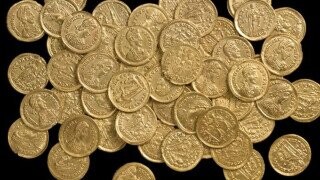Find Buried Treasure In The UK? The Queen Will Take It From You

Here's a comedy plot that used to be popular. The gang go to the beach, and one character brings along a metal detector. "I'm going to be rich!" he says. While everyone else gets involved in something more interesting, funny side guy goes all over the sand with his gizmo. Suddenly, it starts beeping! He digs furiously. But instead of treasure, he finds a bunch of tin cans. Ha, ha! (We used to be easily amused.)
People in real life do sometimes buy metal detectors in search of treasure, with predictably little success. Take the case of one British man named Wesley Carrington, which is absolutely the name we would make up if this were a fake story, but this really happened. He bought a metal detector in 2012 and headed out into a random field. He found a spoon. And then an unremarkable coin.
But then, within 20 minutes of his purchase, he struck gold. He found a Roman coin, and though he doubted it was real—he was an optimist, but not that optimistic—it was. So were the 54 other gold coins he found before the sun set and he had to turn away. He took the coins to the shop where he'd bought the metal detector, and the guy there was even more surprised than he was. Carrington hadn't even bought an especially advanced metal detector.
Don't Miss
So the coins were Wesley's now, right? Not quite. Britain has special rules regarding treasure, "treasure" being an actual legal term defined by the Treasure Act of 1996. If you find buried silver or gold you have to inform the local coroner. You probably associate coroners with assigning cause of death, but it seems they have jurisdiction over all kinds of buried stuff in Britain, as they're a convenient judicial official that every town already has.
The coroner, perhaps after consulting experts, rules on whether the find counts as treasure. Carrington's did. The fifth-century trove was in fact one of the largest hoards of gold coins ever found in England, and it's now on display at the Verulamium Museum close to where it was found.
In these treasure cases, possession of the treasure goes not to the finder but to the Crown. The finder still gets a finder's fee (which is probably all most people would want), but they can't keep the gold coins and swim in them. Those are the rules, and if you don't like them, you can always declare independence.
This fact came from the One Cracked Fact newsletter. Want more like this, straight from your email inbox, without any ads or popups? Join here:
For more lucky finds, check out:
A Bunch Of Old Tins Cans Turned Out To Be Filled With Gold Doubloons
The Search For Yamashita's Gold A.K.A. The Craziest Treasure Hunt In History
4 Reasons Searching For Buried Treasure Sucks IRL
Follow Ryan Menezes on Twitter for more stuff no one should see.
Top image: St. Albans Council
